POSITRON EMISSION TOMOGRAPHY-
COMPUTERIZED TOMOGRAPHY
(PET-CT) PROCEDURES
It is mandatory to present your medical prescription to be able to carry out the tests.
If you are a pregnant woman or if you suspect that you may be so, or if you are breast-feeding,
please notify it to our health staff before performing any test.
All nuclear medicine tests involve the administration of a radiopharmaceutical
with a very low dose of radioactivity, which is eliminated in the following hours through the urinary or digestive routes.
The access of companions to the center is allowed in the case of children and patients who require special attention.
The rest of the patients can come accompanied but, as a health precaution during the pandemic and depending on
the capacity of the waiting room and the criteria of our staff, it is possible that
the companion cannot wait inside the center.
POSITRON EMISSION TOMOGRAPHY-
COMPUTERIZED TOMOGRAPHY
(PET-CT) PROCEDURES
It is mandatory to present your medical prescription to be able to carry out the tests.
If you are a pregnant woman or if you suspect that you may be so, or if you are breast-feeding,
please notify it to our health staff before performing any test.
All nuclear medicine tests involve the administration of a radiopharmaceutical
with a very low dose of radioactivity, which is eliminated in the following hours through the urinary or digestive routes.
The access of companions to the center is allowed in the case of children and patients who require special attention.
The rest of the patients can come accompanied but, as a health precaution during the pandemic and depending on
the capacity of the waiting room and the criteria of our staff, it is possible that
the companion cannot wait inside the center.
abc
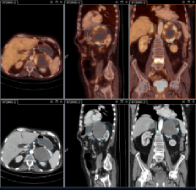
18F-FDG ONCOLOGIC PET-CT
DESCRIPTION:
Study of the disease in oncologic patients.
PREPARATION:
- 6-hour fasting of at least 6 hours before performing the procedure is required.
- In general, it is advisable that patients take a light meal the night before the study and that they do not ingest anything until after it has been done.
- On the day of the procedure, the patient will have to drink abundant water (0.5-1L). Juices, sugary solutions, sweets, etc. are not allowed.
- Urine must not be retained.
- Intravenous glucose solutions should also interrupt at least 6 hours before the scheduled time of the procedure.
- Patients should take their usual medication.
- It is necessary to avoid doing physical exercises 2-3 days before the procedure since this could condition a high muscular uptake of the tracer.
- Diabetic type II and hyperglycemic patients treated with oral antidiabetic medicines should take their usual medication early in the morning and preferably stay in bed at night before performing the test.
- Type I diabietic patients or diabetic patients undergoing subcutaneous or intravenous insulin therapy should take their usual medication early in the morning. To avoid possible hypoglycemia, these patients can take some light breakfast, with a minimum of 4 hours before the procedure.
INDICATIONS:
- Characterization of pancreatic masses.
- Detection of lung pulmonary nodules and evident tumors of unknown origin.
- Detection of recurrences of gliomas with a high degree of malignancy; head and neck tumors; differential thyroid cancer (high TG and negative RCI); primary lung carcinoma; breast, pancreatic, colorectal and ovarian carcinoma; malignant lymphomas; malignant melanomas and other carcinomas.
- Staging of malignant melanoma; locally advanced breast cancer; head and neck tumors; primary lung cancer; esophagus, pancreatic and colorectal cancer; malignant lymphomas.
- Monitoring of the response to the treatment of malignant lymphomas and head and neck tumors.
DURATION OF PROCEDURE:
3 to 4 hours.
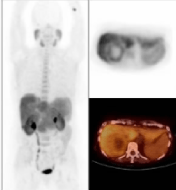
18F-CHOLINE PET-CT
DESCRIPTION:
Study of prostate cancer patients by studying the synthesis of cell membranes.
PREPARATION:
A 2-hour minimum fasting is required.
INDICATIONS:
Prostate cancer staging and follow-up.
DURATION OF PROCEDURE:
3 to 4 hours.
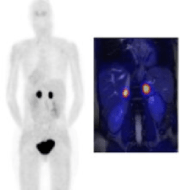
PSMA PET-TC
DESCRIPTION:
Functional and anatomical body assessment of prostate cancer patients through the study of cell membrane synthesis.
PREPARATION:
A 2-hour minimum fasting is required.
INDICATIONS:
Prostate cancer staging and follow-up.
DURATION OF PROCEDURE:
3 to 4 hours.
abc
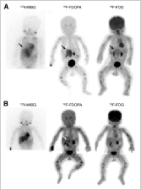
18F-DOPA PET-CT
DESCRIPTION:
The procedure allows diagnosing brain metastases, diseases that degrade the presynaptic dopaminergic system, and catecholamine-producing tumors.
PREPARATION:
4 to 6-hour fasting is required before the injection.
INDICATIONS:
- Pediatric diagnosis of congenital hyperinsulinism.
- Diagnosis of neuroendocrine tumors, pheochromocytomas, neuroblastomas, paragangliomas and brain tumors.
- Assessment of Parkinson’s disease.
DURATION OF PROCEDURE:
3 to 4 hours.
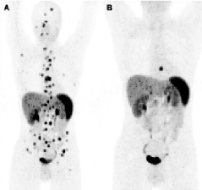
68Ga-DOTATOC PET-CT
DESCRIPTION:
Study of somatostatin receptor overexpression.
PREPARATION:
A 2-hour minimum fasting is required.
INDICATIONS:
Study of gastroenteropancreatic neuroendocrine tumors.
Study of primary lesions, adenopathic involvement and metastatic dissemination.
Study of tumor extension.
DURATION OF PROCEDURE:
3 to 4 hours.
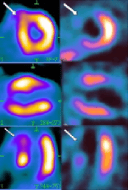
18F-FDG CARDIOLOGIC PET-CT
DESCRIPTION:
Study of the metabolism of cardiac glucose, completing myocardial perfusion studies.
PREPARATION:
- 6-hour fasting.
- Intense physical exercise must be avoided 24 hours before the study.
- An insulin clamp or oral glucose overload must be performed.
INDICATIONS:
Study of myocardial viability.
DURATION OF PROCEDURE:
3 to 4 hours.
abc
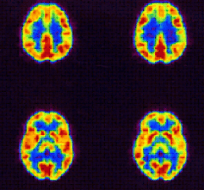
18F-FDG BRAIN PET-CT
DESCRIPTION:
Study of brain glucose metabolism.
PREPARATION:
- 4 to 6-hour fasting.
- Patients should take the usual medication.
- There is the possibility of withdrawing the psychotropic drugs. Diabetic patients should take their usual medication.
- If needed, sedation will be performed 20 minutes after the administration of FDG, preferably before images acquisition, according to the anesthesia procedure.
INDICATIONS:
- Early diagnosis and differential diagnosis of dementias.
- Study of movement disorders, for the characterization of atypical parkinsonisms.
- Delimitation of the epileptographic focus of the interictal phase in epilepsy.
- Evaluation of some psychiatric disorders (schizophrenia, depression, obsessive-compulsive disorder).
- Evaluation of cranioencephalic traumatisms and cerebrovascular pathologies.
DURATION OF PROCEDURE:
3 to 4 hours.
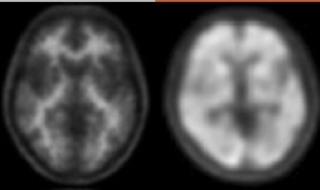
PET-CT FOR THE DETECTION OF
AMYLOID PLAQUE
DESCRIPTION:
Evaluation of the presence of β-Amyloid in the brain.
PREPARATION:
A 2-hour minimum fasting is required.
INDICATIONS:
Early diagnosis and differential diagnosis of dementias by determining the presence or absence of β-Amyloid.
DURATION OF PROCEDURE:
3 to 4 hours.
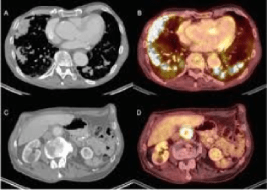
18F-FDG PET-CT FOR THE DETECTION OF
INFLAMMATORY AND INFECTIOUS PROCESSES
DESCRIPTION:
Detection of areas with inflammatory or infectious phenomena in non-soft tissues.
PREPARATION:
- 6-hour fasting.
- Good hydration.
INDICATIONS:
- Sarcoidosis.
- Peripheral osteomyelitis (excluding postoperative and diabetic foot osteomyelitis).
- Suspicion of prostate infection.
- Suspicion of spinal infection (vertebral osteomyelitis, spondylodiscitis or discitis, excluding postoperative infections).
- Evaluation of classical fever of unknown origin.
- Evaluation of metastatic infection and bacteremias.
- Initial evaluation of vasculitis.
- Evaluation of polycystic disease.
- Suspected infection of intravascular devices, pacemakers and catheters. Detection of opportunistic infections in AIDS patients, associated tumors or Castelman’s disease.
DURATION OF PROCEDURE:
3 to 4 hours.
abc
abc
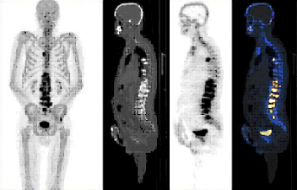
18F-SODIUM FLUORIDE (18F-NaF) PET-CT
DESCRIPTION:
Study of bone metabolism.
PREPARATION:
A 2-hour minimum fasting is required.
INDICATIONS:
Study of primary bone tumors, bone viability, bone necrosis and other benign bone disorders. Bone staging of prostate cancer, breast cancer and other neoplastic diseases with blastic bone metastases.
DURATION OF PROCEDURE:
3 to 4 hours.
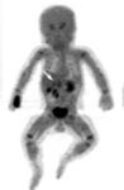
18F-DOPA PET-CT FOR THE PEDIATRIC
EVALUATION OF NEUROBLASTOMAS
AND OTHER NEUROENDOCRINE TUMORS
DESCRIPTION:
Study of dopaminergic uptake in neuroblastomas and other TNEs in pediatric age.
PREPARATION:
A 4-hour minimum fasting is required.
INDICATIONS:
Evaluation of neuroblastomas and other TNEs.
DURATION OF PROCEDURE:
3 to 4 hours.
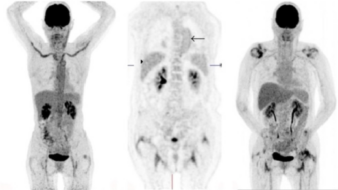
PET-CT FOR THE DIAGNOSIS OF VASCULITIS
DESCRIPTION:
Early diagnosis of inflammation of medium and large-caliber blood vessels and evaluation of the extent and degree of extracranial vascular inflammation.
PREPARATION:
6-hour minimum fasting before the injection is required.
INDICATIONS:
Evaluation of vasculitis of large blood vessels (LBV): Takayasu’a arteritis, giant cell arteritis.
DURATION OF PROCEDURE:
3 to 4 hours.
abc

PET-CT WITH 18F-FDG FOR THE DETECTION OF INFLAMMATORY AND INFECTIOUS PROCESSES IN THE HEART AREA
DESCRIPTION:
Detection of areas with inflammatory or infectious phenomena in tissues of the cardiac area.
PREPARATION:
- Application of a strict low-calorie menu 48 hours before the test (see menu here).
- 12-hour fasting prior to the test is required.
- Good hydration.
INDICATIONS:
- Suspicion of septic or inflammatory processes in the myocardium and great vessels.
- Infection of devices in the cardiac area.
TEST DURATION:
2 to 3 hours.
abc
18F-FDG BRAIN PET-CT
DESCRIPTION
Study of brain glucose metabolism.
PREPARATION
-
4 to 6-hour fasting.
-
Patients should take the usual medication.
-
There is the possibility of withdrawing the psychotropic drugs. Diabetic patients should take their usual medication.
-
If needed, sedation will be performed 20 minutes after the administration of FDG, preferably before images acquisition, according to the anesthesia procedure.
INDICATIONS
- Early diagnosis and differential diagnosis of dementias.
- Study of movement disorders, for the characterization of atypical parkinsonisms.
- Delimitation of the epileptographic focus of the interictal phase in epilepsy.
- Evaluation of some psychiatric disorders (schizophrenia, depression, obsessive-compulsive disorder).
- Evaluation of cranioencephalic traumatisms and cerebrovascular pathologies.
DURATION OF PROCEDURE
3 to 4 hours.
18F-FDG ONCOLOGIC PET-CT
DESCRIPTION
Estudio de la enfermedad de los pacientes oncológicos.
PREPARATION
- Ayuno mínimo de 6 horas antes de realizar la prueba. En general es recomendable que los pacientes tomen una comida ligera la noche anterior al estudio y que no ingieran nada más hasta que termine el mismo.
- El día de la prueba el paciente deberá tomar una abundante ingesta hídrica (0,5-1L). No se permiten zumos, soluciones azucaradas, caramelos, etc. Igualmente, se ha de interrumpir la aplicación de soluciones glucosadas por vía endovenosa un mínimo de 6 horas antes de la hora programada.
- No es necesario retener la orina.
- El paciente puede tomar su medicación habitual.
- Hay que evitar hacer ejercicios físicos los 2-3 días previos a la exploración, ya que ésto podría condicionar una elevada captación muscular del trazador.
- Los pacientes diabéticos tipo II/hiperglicémicos en tratamiento con antidiabéticos orales deberán tomar su medicación habitual a primera hora de la mañana y mantener preferiblemente su estado de ayuno desde la noche antes de realizar la prueba.
- Los pacientes diabéticos tipo I u otros en tractamiento con insulina subcutánea/endovenosa deberán tomar su medicación habitual a primera hora de la mañana. Para evitar posibles hipoglicemias pueden tomar alguna cosa ligera respetando un ayuno mínimo de 4 horas antes de realizar la prueba.
INDICATIONS
- Characterization of pancreatic masses.
- Detection of:
- Lung pulmonary nodules.
- Evident tumors of unknown origin.
- Detection of recurrences of:
- Gliomas with a high degree of malignancy.
- Head and neck tumors.
- Differential thyroid cancer (high TG and negative RCI).
- Primary lung carcinoma.
- Breast carcinoma.
- Pancreatic carcinoma.
- Colorectal carcinoma.
- Ovarian cancer.
- Malignant lymphoma.
- Malignant melanoma.
- Other carcinomas.
- Staging of:
- Malignant melanoma.
- Locally advanced breast cancer.
- Head and neck tumors.
- Primary lung cancer.
- Esophagus cancer.
- Pancreatic cancer.
- Colorectal cancer.
- Malignant lymphomas.
- Monitoring of the response to the treatment of:
- Malignant lymphomas
- Head and neck tumors.
DURATION OF PROCEDURE
3 to 4 hours.
18F-CHOLINE PET-CT
DESCRIPTION
Study of prostate cancer patients by studying the synthesis of cell membranes.
PREPARATION
A 2-hour minimum fasting is required.
INDICATIONS
Prostate cancer staging and follow-up.
DURATION OF PROCEDURE
3 to 4 hours.
18F-DOPA PET-CT
DESCRIPTION
-
Diagnosis of diseases that degrade the presynaptic dopaminergic system.
-
Diagnosis of catecholamine-producing tumors.
PREPARATION
4 to 6-hour fasting is required before the injection.
INDICATIONS
- Diagnosis of brain metastases.
- Differential diagnosis of recurrence-radionecrosis.
- Pediatric diagnosis of congenital hyperinsulinism.
- Diagnosis of neuroendocrine tumors, pheochromocytomas, neuroblastomas, paragangliomas and brain tumors.
- Assessment of Parkinson’s disease.
DURATION OF PROCEDURE
3 to 4 hours.
18F-FDG PET-CT FOR THE DETECTION OF
INFLAMMATORY AND INFECTIOUS PROCESSES
DESCRIPTION
Detection of areas with inflammatory or infectious phenomena in non-soft tissues.
PREPARATION
-
6-hour fasting.
-
Good hydration.
INDICATIONS
- Sarcoidosis.
- Peripheral osteomyelitis (excluding postoperative and diabetic foot osteomyelitis).
- Suspected prosthetic infection.
- Suspicion of spinal infection (vertebral osteomyelitis, spondylodiscitis or discitis, excluding postoperative infections).
- Rating of classical fever of unknown origin.
- Evaluation of metastatic infection and bacteremias. Initial evaluation of vasculitis.
- Evaluation of polycystic disease.
- Suspected infection of intravascular devices, pacemakers and catheters.
- Detection of opportunistic infections in AIDS patients, associated tumors or Castelman’s disease.
DURATION OF PROCEDURE
3 to 4 hours.
18F-SODIUM FLUORIDE (18F-NaF) PET-CT
DESCRIPTION
Study of bone metabolism.
PREPARATION
A 2-hour minimum fasting is required.
INDICATIONS
- Study of primary bone tumors, bone viability, bone necrosis and other benign bone disorders.
- Bone staging of prostate cancer, breast cancer and other neoplastic diseases with blastic bone metastases.
DURATION OF PROCEDURE
3 to 4 hours.
68Ga-DOTATOC PET-CT
DESCRIPTION
Study of somatostatin receptor overexpression.
PREPARATION
A 2-hour minimum fasting is required.
INDICATIONS
- Study of gastroenteropancreatic neuroendocrine tumors.
- Study of primary lesions, adenopathic involvement and metastatic dissemination.
- Study of tumor extension.
DURATION OF PROCEDURE
3 to 4 hours.
PET-CT FOR THE DETECTION OF
AMYLOID PLAQUE
DESCRIPTION
Evaluation of the presence of β-Amyloid in the brain.
PREPARATION
A 2-hour minimum fasting is required.
INDICATIONS
Early diagnosis and differential diagnosis of dementias by determining the presence or absence of β-Amyloid.
DURATION OF PROCEDURE
3 to 4 hours.
PET-CT FOR THE DIAGNOSIS OF VASCULITIS
DESCRIPTION
Early diagnosis of inflammation of medium and large-caliber blood vessels and evaluation of the extent and degree of extracranial vascular inflammation.
PREPARATION
6-hour minimum fasting before the injection is required.
INDICATIONS
- Evaluation of vasculitis of large blood vessels (LBV):
- Takayasu’a arteritis,
- Giant cell arteritis.
DURATION OF PROCEDURE
3 to 4 hours.
18F-DOPA PET-CT FOR THE PEDIATRIC
EVALUATION OF CONGENITAL
HYPERINSULINISME
DESCRIPTION
Evaluation of congenital hyperinsulinisme in children.
PREPARATION
A 4-hour minimum fasting is required. Anesthesia may have to be applied, depending on child’s age.
INDICATIONS
Differential diagnosis of congenital hyperinsulinisme at pediatric ages, differentiating focal and diffuse pancreatic forms.
DURATION OF PROCEDURE
3 to 4 hours.
18F-DOPA PET-CT FOR THE PEDIATRIC
EVALUATION OF NEUROBLASTOMAS
AND OTHER NEUROENDOCRINE TUMORS
DESCRIPTION
Study of dopaminergic uptake in neuroblastomas and other TNEs in pediatric age.
PREPARATION
A 4-hour minimum fasting is required.
INDICATIONS
Evaluation of neuroblastomas and other TNEs.
DURATION OF PROCEDURE
3 to 4 hours.
PET-CT WITH 18F-FDG FOR THE DETECTION
OF INFLAMMATORY AND INFECTIOUS PROCESSES
IN THE HEART AREA
DESCRIPTION
Detection of areas with inflammatory or infectious phenomena in tissues of the cardiac area.
PREPARATION
- Application of a strict low-calorie menu 48 hours before the test (see menu here).
- 12-hour fasting prior to the test is required.
- Good hydration.
INDICATIONS
- Suspicion of septic or inflammatory processes in the myocardium and great vessels.
- Infection of devices in the cardiac area.
DURATION OF PROCEDURE
2 to 3 hours.

ATRYS-SIMM IRLA
Josep Irla i Bosch Street, 5, Building 2
Barcelona 08034, Catalonia, SPAIN
Phone (+34) 93 204 6439
ATRYS-SIMM SJD
Santa Rosa Street 39, Pediatric Cancer Center Barcelona
Esplugues de Llobregat 08950, Catalonia, SPAIN
Phone (+34) 93 254 0470
FAX: (+34) 93 204 9641 · E-MAIL: info.simm@atryshealth.com
At ATRYS-SIMM your personal data is treated in accordance with the principles and rights contained in the GDPR law 2016/679 of April 27, 2016 and in the LOPDGDD law 3/2018 of December 5, 2018.
You can exercise your rights by contacting us by email to protecciondatos-sp@atryshealth.com.
ATRYS-SIMM IRLA
Josep Irla i Bosch Street, 5, Building 2
Barcelona 08034, Catalonia, SPAIN
Phone (+34) 93 204 6439
ATRYS-SIMM SJD
Santa Rosa Street, 39
Esplugues de Llobregat 08950, Catalonia, SPAIN
Phone (+34) 93 254 0470
FAX: (+34) 93 204 9641
E-MAIL: info.simm@atryshealth.com
At ATRYS-SIMM your personal data is treated in accordance with
the principles and rights contained in the GDPR law 2016/679 of
April 27, 2016 and in the LOPDGDD law 3/2018 of December 5, 2018.
You can exercise your rights by contacting us by
email to protecciondatos-sp@atryshealth.com.


